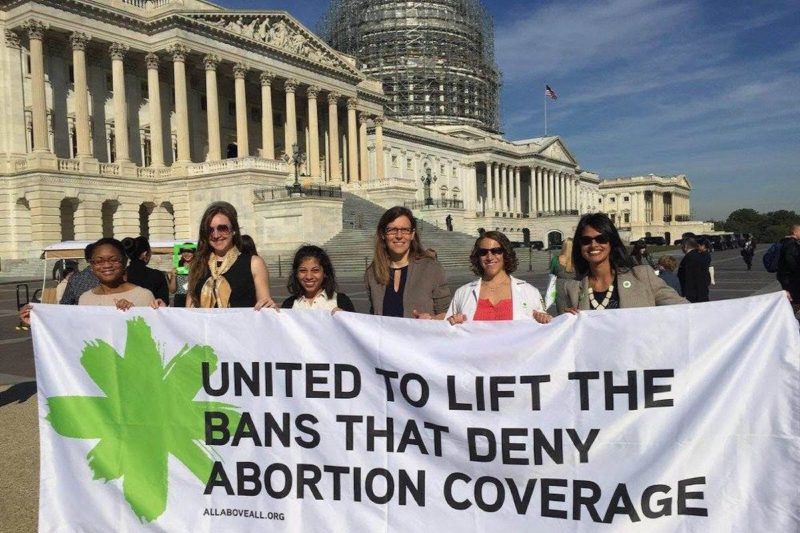Want to Win on Abortion? Acknowledge the Contributions of Women of Color and Embrace Our Values-Based Approach
A response to the recent Rewire commentary, "Want to Lose on Abortion? Talk About It as an Economic Issue."

Women of color who have shaped and are leading the fight for abortion rights and reproductive justice today have not always been recognized for our innovation, strategic insights, and transformative achievements. We have charged forward anyway, while also transforming the terms of the fight. Unfortunately, our history, our political savvy, and our commitment to our values and communities continue to be erased, overshadowed, and critiqued, including by those who claim to be on our side.
In “Want to Lose on Abortion? Talk About It as an Economic Issue,” Anat Shenker-Osorio and Sharon Rose Goldtzvik have a lot of advice for how we should talk about abortion. The good news is that we’ve already been changing the game on abortion messaging, with powerful effect, and we have the successes to prove it.
Women of color, and those of us who work in solidarity with them, have paved the way for a new paradigm in abortion messaging that holds to our values, is accountable to our communities, and—research has shown—helps us win.
The second-wave feminists of the 1970s and ’80s favored the language of “choice”—and while this language resonated for some, it failed to sufficiently articulate a justice-based values approach. It left many out, especially low-income women and young people, and ignored the need for a role for our communities and institutions in supporting and sustaining our rights.
And while the echoes of that “choice” framework are still bouncing around, the movement has mostly moved on, and some of us were never there in the first place. As early as 1994, Black women rejected the “choice” framework, embraced values-focused language, and articulated a vision for abortion rights that centered low-income people and acknowledged the connections between reproduction and economics. This shift, solidified in the last decade, is due in large part to the work of women of color reproductive justice advocates. On the 20th anniversary of the reproductive justice movement, we again had to remind people of this legacy.
At this point, to critique the “choice” framework (as Shenker-Osorio and Goldtzvik do) is to present a straw (wo)man—leading advocates for reproductive health, rights, and justice aren’t using it any more.
Perhaps the most offensive omission from Shenker-Osorio and Goldtzvik’s piece is the erasure of women of color—and low-income women specifically. It misses the essential point that for some women our reproductive options and our economic status are intertwined, and cannot be separated in rhetoric or reality.
We are and always have been fighting for the right to have children, not just to end pregnancies. When we argue that economic issues are inseparable from the right to abortion, we are not making a cost-based argument for abortion access—we are making a justice-based argument for reproductive autonomy. We are bridging reproductive and economic justice by creating empathy for women struggling to make ends meet.
We’ve also succeeded in building our movements by lifting the voices of labor leaders for abortion rights. From a movement-building perspective, we start with core values we share with economic justice groups, for example, respecting all work and demanding dignity in the workplace. When we connect these with how abortion has an impact on their constituents, it helps open up their perspective about the interconnections between our struggles.
Moreover, the piece makes no distinction between proactive messaging and framing the issues versus fending off the accusation that abortion cost us the election. There are few who are advocating that we make an economic argument our primary argument for abortion, but when the Democratic Party pits economic justice against abortion rights it must be held accountable for erasing the reality of our lives.
If we ignore women struggling to make ends meet, we are erasing Black and brown women from the picture. As Destiny Lopez argued in the Washington Post, “For many of us, [the Hyde Amendment] is deeply connected to our support for women’s health and rights, inseparable from economic and racial justice, and intrinsic to freedom from political interference with our most personal decisions.”
Our movement is not in need of lectures from progressives who think we’re at turns naïve idealists and craven political utilitarians. Robust and even oppositional dialogue is critical for growth. But don’t erase our history, misconstrue our strategies, and purport to have all the answers. That’s been happening for far too long.
We are—and must be—rooted in our values, responsive to our communities, research-informed, and politically savvy. The movement to end Hyde is one clear example of these competencies at work. We will keep doing the work necessary to liberate our communities, keep doing the impossible, and even when our work goes unrecognized, we’ll continue to support one another as we move closer each day to victory.
Sincerely,
Jessica Gonzalez-Rojas, National Latina Institute for Reproductive Health
Marcela Howell, In Our Own Voice: National Black Women’s Reproductive Justice Agenda
Eveline Shen, Forward Together
Dazon Dixon Diallo, SisterLove, Inc.
Marsha Jones, The Afiya Center
Karen Law, Pro-Choice Resources
La’Tasha D. Mayes, New Voices for Reproductive Justice
Fatima Goss Graves, National Women’s Law Center
Parker Dockray, MSW, All-Options
Carly Manes, National Council of Jewish Women
Andrea Miller, National Institute for Reproductive Health
Rev. Marie Alford-Harkey, Religious Institute
Diana Rhodes, Advocates for Youth
Amy Casso, Western States Center
Margaret Chapman Pomponio, WV FREE
Grayson Dempsey, Oregon Foundation for Reproductive Health
Sung Yeon Choimorrow, National Asian American Pacific Women’s Forum
